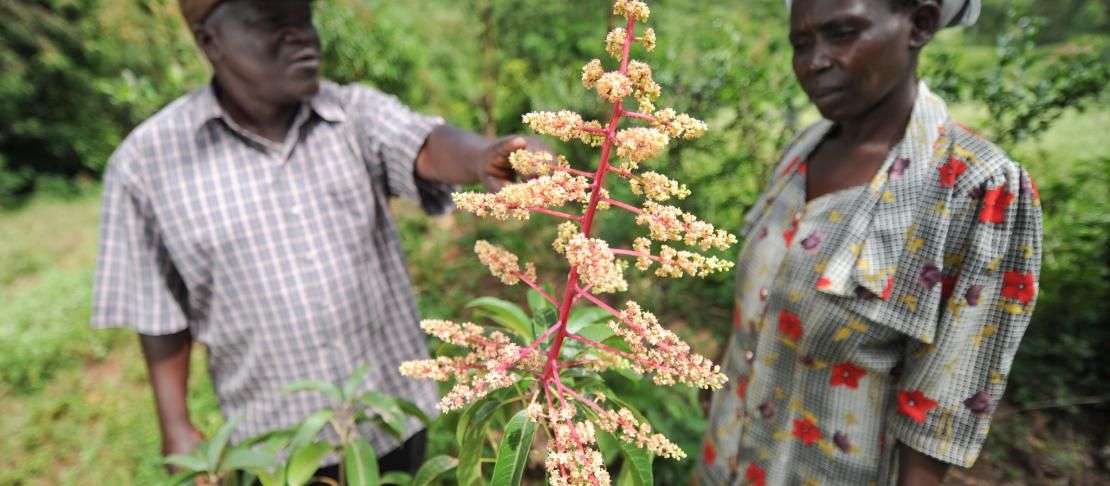The climate-smart way of transforming agriculture in Africa

Highlighting the opportunities and challenges of scaling up climate-smart agriculture and Climate-Smart Villages in East Africa.
Agricultural systems in East Africa are mainly rain-fed and highly vulnerable to climate change and variability. The frequency and severity of climate shocks such as drought, floods, heat and cold stress have increased with negative impacts on agriculture and food security.
The CGIAR Research Program on Climate Change, Agriculture and Food Security (CCAFS) East Africa Regional Program is working in Ethiopia, Tanzania, Uganda and Kenya to help farming communities adapt to the effects of climate change. CCAFS work involves action on the ground, engagement with partner organizations and policymakers, and research. CCAFS East Africa research work focuses on climate-smart agriculture (CSA) technologies and practices, and the testing of these CSA interventions in Climate-Smart Villages (CSVs).
In a recently published book titled “Climate and Environmental Justice in Africa”, CCAFS scientists highlight the opportunities and challenges of scaling up CSA and CSVs in the region.
Climate-Smart Agriculture Partnership for Africa: Prospects and Challenges
In the article on CSA partnerships for Africa, CCAFS scientists express the need to reduce climate vulnerability of the African agriculture sector, and suggest that there’s no silver bullet pathway for achieving sustainable agricultural growth in Africa. Instead, the continent’s agricultural transformation will depend on multiple and context-specific pathways that seek to address the main challenges of climate change, food and nutrition security, natural resource depletion and land degradation, limited market and trade opportunities, while contributing to mitigation of greenhouse gas (GHG) emissions.
CSA provides opportunities that can address the diverse needs of stakeholders as well as the production contexts of different farmers to yield winning outcomes of increasing food production and incomes, and reduce GHG emissions. The authors highlight a few examples of CSA practices that perform well under variable weather conditions, such as development and adaptation of stress tolerant crops and livestock breeds; innovations for combining conservation agriculture (CA) and integrated soil fertility management (ISFM) technologies; diversification in crop-livestock production systems; water harvesting and soil and water conservation in rain-fed and irrigated systems.
The authors suggest that the success of CSA in Africa will depend on the capacity of farming communities, governments, and regional and national institutions to understand various climate change realted risks. They express the need for a continent-wide partnership of diverse stakeholders to address the multiple aspects of the problems and challenges which the CSA agenda seeks to achieve. The authors highlight the Climate-Smart Agriculture Partnership for Africa (CSAP-Africa); as a response to the global calls for the promotion of climate-smart agriculture solutions, as most governments and sub-regional organizations in Africa are developing policy frameworks and strategic plans for climate change adaptation and mitigation.
Climate-Smart Villages: A Community Approach to Climate Resilient Agriculture and Sustainable Livelihoods
The diversity of Africa’s farming systems, coupled with socio-cultural practices and systems of social and political governance, demands for localized adaptation interventions. Agricultural adaptation will involve developing a range of new technologies and farm-level innovations for crops and livestock, farmer services, markets, and institutional arrangements and policy reforms. Localizing interventions will enable farmers and farmer groups to access appropriate agricultural technologies, climate information, and enable technological and institutional innovations.
To explore how localized interventions can enhance and sustain agricultural productivity in addition to increasing resilience to climate change, farmers, in partnership with CCAFS East Africa, national and international research institutions, the private sector, non-governmental organizations and community-based organizations (CBOs) initiated the CSVs approach that could increase food security, enhance resilience to climate change and reduce GHG emissions.
CCAFS has been working in the Nyando Climate-Smart Villages in Kenya, with over 2,000 households, to test a portfolio of climate-smart agricultural interventions. CCAFS and partners provide opportunities for adaptive learning and innovation that builds household and community resilience through participatory action research and field-based learning approaches.
Through this process, farming households are making progressive changes to their crops as well as introducing new climate resilient livestock breeds. The farming households are able to apply new agricultural knowledge and practices to address climate-related risks and build resilience at local scales.
By using the evidence from the CSVs, CCAFS is also involved in engaging policymakers to provide a supportive policy environment in which farmers can access technologies and other incentives for adaptation.
There is huge potential for African policymakers at local, national and regional or continental levels to embrace CSA and scale up CSVs; and commit to transformational change processes that spur sustainable agricultural growth and utilization of natural ecosystems. But this will call for revamping their knowledge of agriculture and technology systems, in particular, critical technical and policy advisory services on CSA as well as a sustainable governance of agricultural support systems.
Read more:
- Mapfumo P, Nyasimi M, Speranza CI, Wamukoya G, Kinyangi J. 2017. Climate Smart Agriculture Partnership for Africa: Prospects and Challenges. In: Mwaniki R, Khaemba W, Kimotho S, Ochieng C, eds. Climate and Environmental Justice in Africa. Nairobi: African Centre for Technology Studies. P. 99-128.
- Kimeli P, Nyasimi M, Mungai C, Kinyangi J, Radeny M, Recha J. 2017. Climate Smart Villages: A Community Approach to Climate Resilient Agriculture and Sustainable Livelihoods. In: Mwaniki R, Khaemba W, Kimotho S, Ochieng C, eds. Climate and Environmental Justice in Africa. Nairobi: African Centre for Technology Studies. p. 7-33.
- Recha J, Kimeli P, Atakos V, Radeny M, Mungai C. 2017. Stories of Success:Climate-Smart Villages in East Africa. Wageningen, Netherlands: CGIAR Research Program on Climate Change, Agriculture and Food Security (CCAFS).
- Project page: Scaling up Climate-Smart Village models in East Africa
- Blog: Examples of good practices on climate change adaptation from Nyando shared to foster learning



